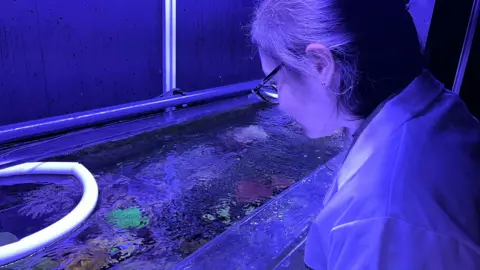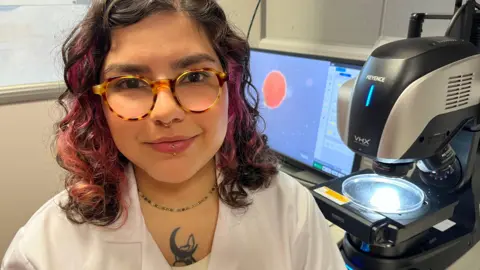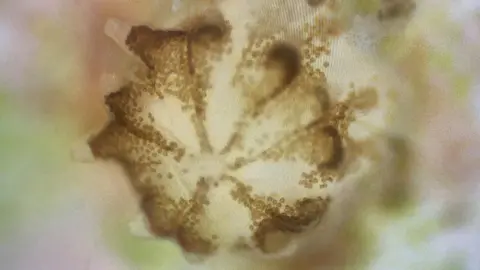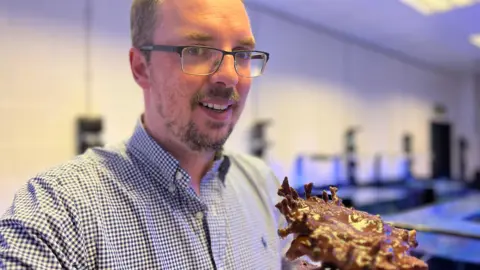www.bbc.com /news/articles/c25rxyxdqd9oExperts work to 'breed' coral to fight climate change and disease
Sally Bowman4-5 minutes 4/27/2024
'We are learning how to act as coral midwives'
1 day ago
Sally Bowman,BBC News, East Midlands
Professor Michael Sweet's team is leading global coral research
BBC
A team at the University of Derby is at the forefront of a race to save our coral reefs.
Their research centres on breeding coral, which is more resilient to climate change and disease.
Laboratories around the world now use a system, first developed by the university team, that "coaxes" corals to spawn during daylight hours across the year.
Some scientists are predicting that climate change means we will lose 90% of our coral reefs by 2030.
Researchers use artificial moonlight to stimulate coral spawning
Corals reproduce by releasing male and female cells, which float to the ocean surface and mingle to create tiny larvae.
The precise timing of this seasonal phenomenon is linked to seawater temperature, lunar phases, and the daily cycle of light and dark.
In Derby, the spawning tanks are kept in a darkroom and lit by artificial moonlight to trigger time-phased spawning to fit research timetables.
"Enhanced evolution"
Spawning coral to order helps scientists develop colonies that can better cope with warming waters.
Professor Michael Sweet explains what they do as "enhanced evolution" to speed up a natural process.
First, they put various coral species through a thermal stress test in the lab.
Then they breed from the ones that do best.
Those resilient corals can be pushed back out onto damaged reefs at scale.
Baby coral larvae are fragile. Only an estimated one in a million fertilised eggs survives to become adult coral.
The team is experimenting with microbes, which help feed the larvae and encourage them to settle and grow.
PhD candidate Taissa Damasceno says good bacteria can help coral larvae survive
PhD candidate Taissa Damasceno says researchers have had dramatic results. In recent experiments, dosing settlement plugs with good bacteria increased settlement rates by 1,400%.
Ms Damasceno's native country of Brazil has seen massive coral bleaching in recent years, particularly on the north-east coast.
"It's really sad," she says. "I have friends working there, and they're in despair."
Rare coral specimens can be grown in laboratories
Coral reefs are also damaged by collectors who sell rare specimens to dealers for aquariums. Some can be sold for hundreds of pounds.
The Derby team is learning how to act as coral "midwives" and grow sought-after species in labs.
They are working with a team in Indonesia to develop a blueprint that could provide an income for cash-strapped communities.
Coral reefs have been dubbed "the rainforests of the oceans", supporting around a third of all marine species at some point in their life cycle.
More than half a billion people worldwide rely on coral reef fisheries for 95% of their protein, often in the poorest developing countries. Reefs also protect coastal communities from storm surges.
But record ocean heat is taking a toll. Scientists say we are now in the middle of the fourth global mass coral bleaching event, where coral turns white and eventually starves to death.
Prof Sweet describes the current state of global coral as "alarming"
Coral reefs have been described as "canaries in the coal mine".
The bleaching of so many reefs around the world offers an early warning that climate change is accelerating.
Despite lab successes, Prof Sweet describes their work as "sticking plasters".
"These techniques and tools will give coral a little bit more of a fighting chance," he says.
"But nothing is going to work unless we target our carbon footprint. It's not just about limiting; it's actually about reducing the amount of carbon in our atmosphere. We need to act."
- Forums
- Political Debate
- Accelerate the World's Transition to Sustainable Energy - to fight Anthropogenic Climate Change
Accelerate the World's Transition to Sustainable Energy - to fight Anthropogenic Climate Change, page-32968
-
- There are more pages in this discussion • 6,668 more messages in this thread...
You’re viewing a single post only. To view the entire thread just sign in or Join Now (FREE)
Featured News
Featured News
The Watchlist
EQN
EQUINOX RESOURCES LIMITED.
Zac Komur, MD & CEO
Zac Komur
MD & CEO
SPONSORED BY The Market Online













